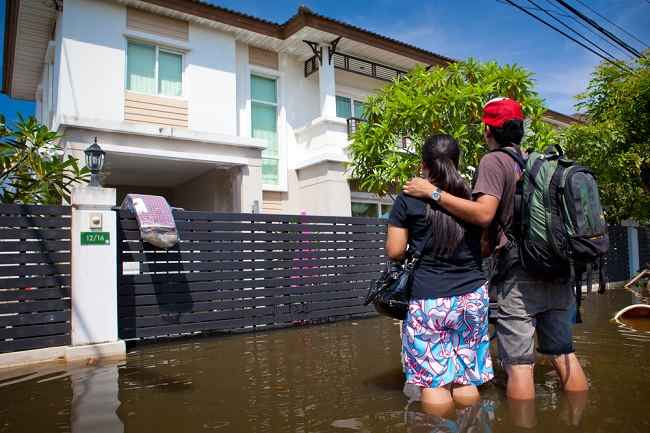How to Maintain Your Health and Family During Floods
The rainy season often creates a number of problems. One of them is a flood that can occur at any time. Therefore, it is important to prepare everything in order to maintain the health and safety of self and family during floods.
During the rainy season, endurance tends to weaken with changes in temperature and humidity, especially if exposed to flooding. Poor water quality and a dirty environment make your body more vulnerable to various diseases, ranging from diarrhea, cholera, dengue fever, malaria, leptospirosis, to ARI.

Preparation Before Floods Occur
If staying in areas that are flooded, you need to do some preparation to anticipate floods that might occur during the rainy season.
The following are some things that you need to prepare before the flood:
1. Prepare a bag containing emergency supplies during a flood
This emergency supply bag must be filled with important items that can be used for the purposes of being displaced during a flood, such as bottled mineral water, durable instant food, equipment toiletries, clothes, flashlights, blankets, and personal medicines. Don't forget to bring important documents too.
2. Put furniture or household appliances into the house
Put furniture or equipment that is normally placed outside the house into the house, such as chairs, garden tools, or household utensils, such as brooms and water hose . The aim is that these items do not drift away and do not cover the exit when a flood occurs.
3. Strengthen your immune system by consuming balanced nutritious food
Make sure you and your family always eat balanced nutritious food, especially fruits and vegetables, to meet nutritional intake and maintain endurance. Wash fruits and vegetables first with clean water before consumption, to prevent germs from entering the body.
Seeing the importance of fruits and vegetables for endurance, it is recommended that you put fruits and vegetables in your daily menu, from breakfast to lunch to dinner, at least 1 serving per meal.
4. Use clear water cleanliness
During the rainy season, the environment often becomes moist and dirty so that germs that cause disease are more easily developed. Water is a medium for germs to enter the body.
Therefore, avoid consuming and using well water or plumbing that looks turbid and smelly, whether for drinking, bathing, or washing clothes. This is done to prevent skin infections and gastrointestinal disorders.
By making good preparations, the risk of danger from accidents or illness during floods can be reduced.
Actions taken Need to Do When Affected by a Flood
If your house and the surrounding area are flooded, consider the following:
- Avoid direct contact with the power source, especially in parts of houses that are flooded.
- Avoid driving through roads that are flooded as high as 15 cm or more, because it can make you lose control when driving.
- Consumption of water that is guaranteed of cleanliness, such as bottled or gallon mineral water, especially for infants, children and the elderly.
- Use gloves and rubber boots when you enter a room in a waterlogged house. This equipment can protect you and your family from germs, dirt, and animal bites.
- If forced to live in refugee camps, make sure you and your family maintain personal hygiene and the environment by washing your hands regularly and avoiding people who are sick .
- If you or your family has fallen ill, such as a cough or runny nose, try to always cover your nose and mouth when coughing or sneeze and always use a mask to prevent transmission to others.
Actions to Do After the Tidal Floods
When the flood starts to recede, you will naturally be surrounded by a pile of rubbish and mud, so you should clean it up. Things you need to do after the flood recedes include:
- Use equipment, such as handkerchiefs and rubber boots when cleaning the house.
- Clean the floor and room from mud with a floor cleaning solution.
- Also clean the furniture and walls of the house with a disinfectant solution. This solution can be made by mixing 1 cup of chlorine liquid with 5 gallons of water.
- Dispose of objects or household furniture, such as mattresses, pillows, bolsters, or carpets, which are damaged, unsuitable for use, and impossible cleaned.
- Be careful when cleaning the house, because there may be wild animals, such as snakes, entering the house during floods.
- Use mosquito nets while sleeping, especially if you live in environment that is prone to dengue fever and malaria.
- Make sure the water you consume is clean and has been cooked thoroughly, because it is possible that the source of water or ground water in your home has been contaminated with dirt and germs carried by the flood.
You and your family should also carry out additional vaccinations for diseases that often come during floods, such as vaccinations for influenza, typhoid fever, and rotavirus (especially infants under 6 months of age).
Go immediately to a doctor if you or a family member a You experience health problems after a flood, especially if there is a high fever accompanied by coughing and runny nose, shortness of breath, pain in some parts of the body, yellow eyes, and digestive disorders, such as diarrhea, nausea, vomiting, or constipation.
Written by:
Alya Hananti
Label : Healthy life
Comments
Post a Comment